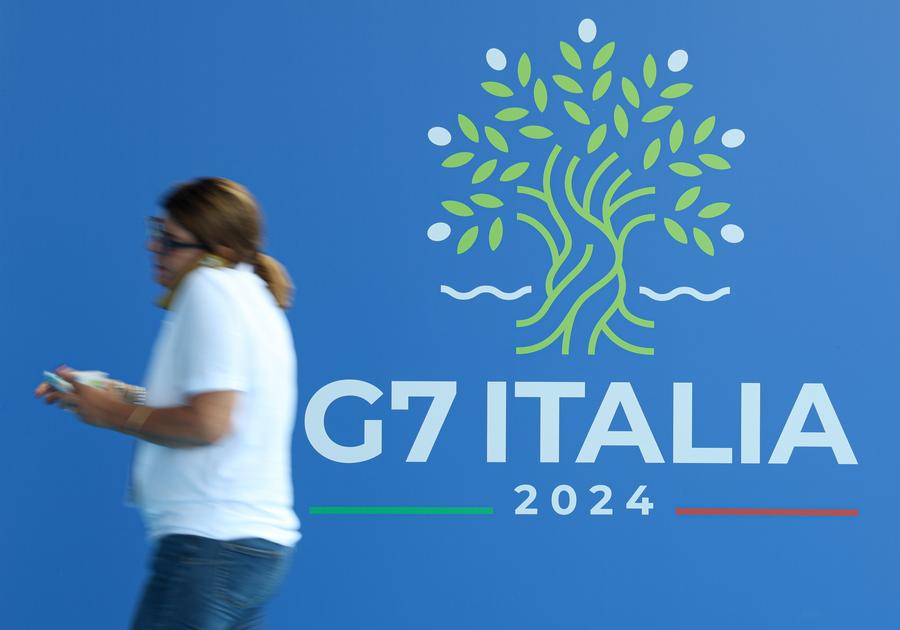
A woman walks past the banner of the Group of Seven (G7) summit at the media center in Bari, Apulia Region, Italy, June 12, 2024. [Photo/Xinhua]
This is an editorial from China Daily.
The fighting between Russian and Ukrainian forces has been grueling, and increasingly so, for both belligerents. A complete victory on the battlefield is no doubt the desired outcome of both. But achieving it will be taxing, as it is a remote possibility. More devastating punishment is the more likely outcome for both as the fighting drags on.
As many have bluntly said, a Russian defeat on the battlefield would probably erase it permanently from the roster of world powers; while a defeat for Ukraine might risk the country being abandoned by the West. As a sense of uncertainty grows in Moscow and Kyiv as well as among international stakeholders, it is only natural for both sides to accept that a negotiated end is in their best interests. Russian President Vladimir Putin and Ukrainian President Volodymyr Zelensky both see it.
Zelensky personally proposed the global peace conference that just concluded in Switzerland this past weekend. While Putin again expressed his readiness to negotiate an end to the conflict ahead of the scores of participating world leaders meeting in Geneva.
Yet their respective conditions seem too divergent for any meaningful progress toward peace. As the Russian leader stated on Friday, his include Kyiv ceding territories including Crimea and those under Russian control now, staying nonnuclear and restricting its military, and forsaking its NATO ambitions. But those demands are obviously too much from Kyiv's perspective. Zelensky's demands are that Moscow withdraw its troops and return the territories it now controls, including Crimea, and compensate Ukraine for the damages it has suffered as a result of Russia's "special military operation".
But for all the Western criticism Beijing has endured so far regarding its unwaveringly principled approach to the conflict, Beijing is correct in holding firm to the position that any peace initiative that excludes Moscow will get nowhere. This was apparent at the just-concluded peace conference in Geneva. Beyond talk about such common concerns as nuclear safety, humanitarian aid and food security, little was accomplished regarding ending the hostilities.
For its proposal that it is necessary for Moscow to be included in the process, Beijing has been a regular target of Western attacks. Beijing has repeatedly underscored the impossibility of a negotiated end to the conflict without the latter's meaningful participation. That was precisely why the meeting in Geneva turned out to be more symbolic than substantive.
But in addition to excluding Russia, major Western countries have sought to incriminate China as an accomplice of what they decry as Russian aggression. Without providing a shred of evidence, both US President Joe Biden and the G7 leaders' statement accused Beijing of supporting Russia, even as all the while they are providing military assistance to Ukraine.
While reiterating their support for Ukraine for as long as it takes, and their shared commitment to tighten the screw on Russia, they pledged to penalize China for its alleged role in propping up Russia's military behind the scenes. "China does not supply weapons, but the ability to produce those weapons and the technology available to do it," Biden alleged on Thursday. "So it is, in fact, helping Russia." And the G7 statement vowed measures "against actors in China and third countries that materially support Russia's war machine …"
Such allegations contraindicate their working in good faith with Beijing to secure a settlement to the crisis. But then it is questionable whether they truly seek an end to the crisis rather than imposing their long-desired vision of Russia's position and role in the European order on Moscow. Excluded from being an accepted autonomous member of post-Soviet European economic integration except as a begrudged energy supplier, what is on the table now is essentially that Russia become a vassal state of the United States.
A meaningful peace process, as Beijing has repeatedly pointed out, must be centered on constructive engagement with Moscow and its security needs. But that is not music to Western ears preoccupied with bringing Moscow to its knees rather than ending the bloodshed as soon as possible.

 中文
中文



